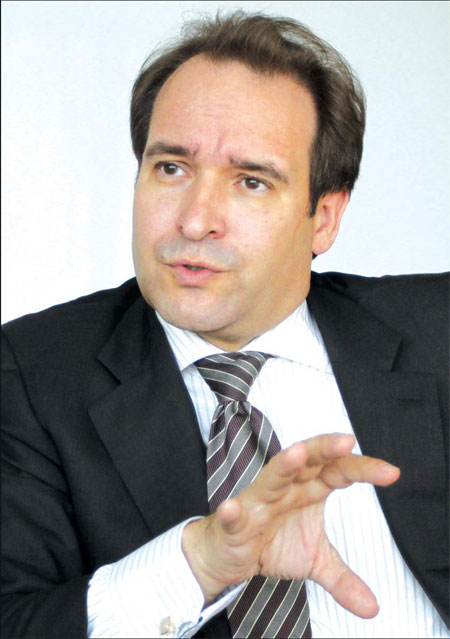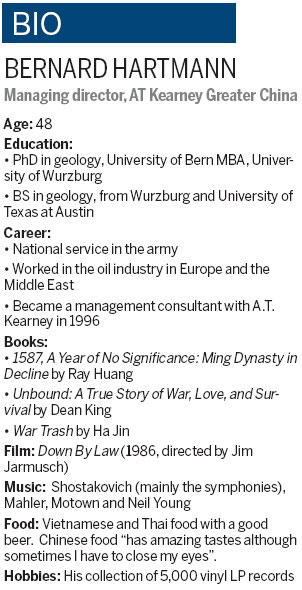Economy
Past Perfect
Updated: 2010-12-10 14:11
By Andrew Moody (China Daily European Weekly)
 |
| Bernhard Hartmann says the adaptability of Chinese firms is impressive. Liu Zhe / China Daily |
Management consultant delves into Chinese history and five-year plans to find clues to nation's future
Bernhard Hartmann, one of the leading management consultants in China, has no time for those who make quick judgments about the future of the world's second largest economy. The 48-year-old German dismisses, in particular, a lot of the new business-orientated books regularly published in the West that examine trends in the country.
"They are often at least a year out of date and describe yesterday's trends but make these supposedly impressive statements about China going forward," he says.
The geologist believes China of today can still be best understood by delving into the layers of its past.
"I think what you see right now is solidly rooted in historical developments in the past. I prefer to read histories of the Boxer Rebellion or the Taiping Revolution for the answers to now," he says.
The urbane Hartmann has a panoramic view of modern Beijing from his company's office on the 26th floor of China Central Place in Chaoyang district.
He says one thing he does read to give an indication as to what is going to happen is perhaps the most authoritative source of all, the Chinese government's Five-Year Plan.
He has just scrutinized the 2011-2015 one, including doing a word count of various parts to find out where the most emphasis is being placed.
"For us, you know, every five years we read the next Five-Year Plan. For me it is a kind of exercise. In this one, when it says we are looking at harmonious development it sounds like a slogan but it is actually a clear-cut message that sustainable development is high on the agenda," he says.
"It is a contrast from the past. It used to be all growth, growth, growth. Now it is a lot more farsighted," he says.

Hartmann, who has a background in the oil industry, joined a US international management consultancy 13 years ago and has been in China since 2004.
He says the sheer pace of development in China creates many eccentric businesses unseen in developed markets such as Europe.
"Nowhere else in the world do you get a mom-and-pop shop operation starting in a backyard becoming half-a-billion-dollar revenue business within a few years," he says.
"The problem is, however, they still have a management system in place that is more suitable to the backyard."
Such gaps in management capability create a market for international management consultancies such as A.T. Kearney, which also has offices in Shanghai and Hong Kong. Hartmann is managing director for Greater China of A.T. Kearney.
He says the role of management consultancy firms has drastically changed over recent years.
"I think historically the role of management consulting in China was to piggyback on global clients which had developed footprints here in China. Today, 70 percent of our work is purely with Chinese companies."
Hartmann says that despite China being a "very unique system" and the preponderance of State-owned enterprises in many of the key sectors of the economy, Chinese management has proved itself very adaptable.
"If you have someone who has been very successful in this market and you challenge them to work in a totally different environment such as being listed on Wall Street and having to deal with analysts, you could say there was a real gap in leadership experience and in capability. That may be true but I'm really quite impressed by the speed of adaptation and the willingness to learn," he says.
Hartmann says where management consultants have a role in China is in bringing modern management techniques into businesses.
He says many companies in Europe and in the rest of the world use systems that almost enable them to run on "automatic pilot".
"It is almost like a dashboard in a car. It tells you whether you are going too fast, too slow or your motor is running hot," he says.
"Western companies have had these systems, revolving around key performance indicators for 20 or 30 years and Chinese companies are now building up these capabilities."
Hartmann, from Kirch-Brombach, near Heidelberg, had to do 15 months in the German army as part of his national service at the age of 18.
He studied geology and management at the University of Wurzburg in Germany and also at the University of Texas at Austin, before doing a doctorate in geology at the University of Bern in Switzerland.
He then went on to work in the oil industry for major companies such as Mobil but was persuaded to change his career direction by his wife when the oil price fell to $10 a barrel (7.48 euros) in the mid-1990s.
"She worked for Merrill Lynch at the time and she said to me I was hardly going to make big bucks in technology since there was hardly any exploration being done," he recalls.
He joined A.T. Kearney in December 1996, which has a reputation for hiring people with experience rather than just MBA graduates.
"I am a product of Kearney's culture. I am not a classic management graduate and I was rather old, nearly 35, when I joined."
He says there is danger of people coming to China of thinking they can just apply the same model which works elsewhere.
"When I came to China I was rooted in experience from my home market. It took me a long time to understand this is normally the wrong approach. Now, whenever I come up with a solution I check it with colleagues within my team. Currently, more than 90 percent of our people here are Chinese."
Hartmann says despite what people think on the outside there are significant risks in the Chinese economy.
He says a lot of the fast-growing private businesses that have emerged in recent years have no experience of anything other than near double-digit growth.
"They sometimes have grown 50 percent a year in their first five years of life and have no experience of a downturn. Their management teams haven't steered a company through a whole cycle and haven't stood the test of time."
He also believes there are significant big-picture challenges for the Chinese government over the next 10 or 15 years.
"China certainly has huge ecology issues. What's even more problematic for me is the demographics and the absence of a functioning healthcare system, no real pension support structure going forward. But nonetheless the story so far has been impressive and we see these issues now popping up on the agenda of the government."
Hartmann, however, does believe that China will avoid running into the same problems as Japan, where the economy has almost stalled for 20 years after decades of fast growth.
He says this is because China's strength is not its exports, which helped fuel its growth in the 1990s, but its huge domestic market.
"What is driving the economy now is sectors like automotive - it is already the world's largest car maker with hardly anything exported - and chemicals, where China will be the world's largest producer by 2015. It is purely domestic and that is where the China story will be significantly different from that of Japan."
Xiao Xiangyi contributed to this story.
E-paper

Ear We Go
China and the world set to embrace the merciful, peaceful year of rabbit
Preview of the coming issue
Carrefour finds the going tough in China
Maid to Order
Specials

Mysteries written in blood
Historical records and Caucasian features of locals suggest link with Roman Empire.

Winning Charm
Coastal Yantai banks on little things that matter to grow

New rules to hit property market
The State Council launched a new round of measures to rein in property prices.
